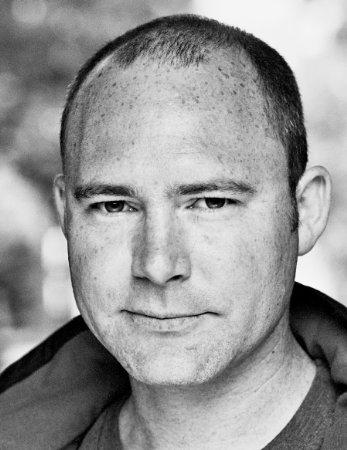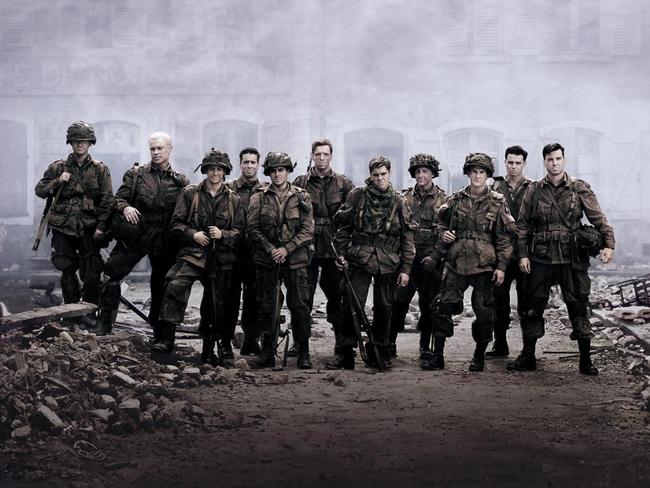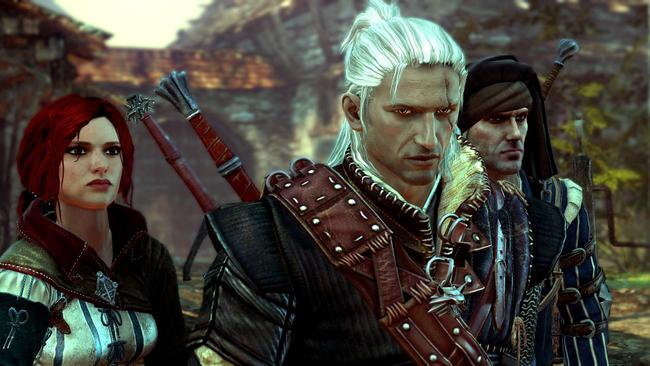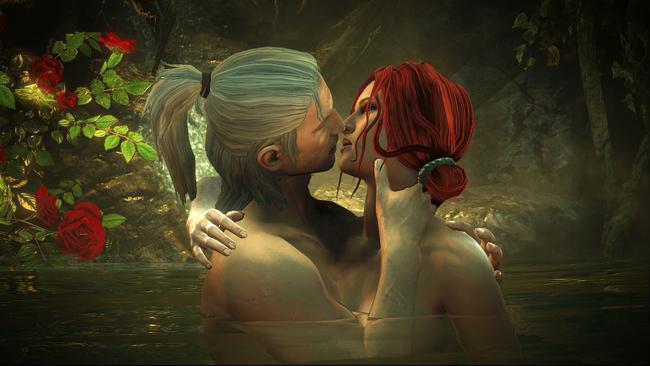
Doug Cockle Interview
The Witcher was a game whose quality took many people by surprise when it was released in 2007. It is because of that quality that its sequel, The Witcher 2: Assassins of Kings, is a title that many have been looking forward to, despite being released at the same time as several heavy hitters. We seized the opportunity to talk to Doug Cockle, the voice of Geralt of Rivia, about his training, his time on shows such as Band of Brothers and of course his work on the Witcher series.

RPGSite: Hi Doug, thanks for joining us today. How are you?
Doug Cockle: Fine thank you!
RPGSite: As we talk, you are an established actor based here in the United Kingdom but your story starts in California, USA. What can you tell us about your background?
Doug: Well, where do I start? My father was a U.S. Marine Corps officer and I was born on the Marine Corps base in Twentynine-Palms, California, but then we moved around a bit. So I lived in California (twice), Washington (twice), Oklahoma and Virginia when I was growing up.
It was good in a lot of ways because I got to see a lot of different things and meet lots of people along the way. Sometimes I feel a little jealous of people I know who grew up in the same town until they left home because of the sense of roots they often have, but I think all the moving of homes and schools made me quite an adaptable person so I guess it has its upsides too!
RPGSite: The earliest information I can find in relation to your professional acting career is from 2001 but obviously your passion for the art goes back much further – do you remember when and why you were first attracted to the world of acting?
Doug: Oh it was purely out of jealousy that I got into acting! When I was about 12 or 13 my younger sister was in a play as part of a summer program called Governors School. She played a court jester kind of character and had the whole audience laughing and I just turned green with envy.
Actually, I think my mom would say that I was always performing in some way as a child. I took drama in high school and had a great time, but it wasn’t until university that I actually thought of acting as a potential career choice.
RPGSite: Which university did you attend and what course did you study?
Doug: I studied Theatre Arts at Virginia Tech University. I actually got into Virginia Tech as a pre-medicine Biology major, but had a very drastic change of heart over the summer and changed my major to Theatre Arts just before I arrived.
I had started really thinking about what I wanted to be doing in 20 years time and the only thing I was REALLY attracted to do was acting. I think I saw a production of Les Misérables at the National Theatre in Washington DC around that time too and it woke something up in me that I just couldn’t deny. I haven’t looked back since!
RPGSite: Was the course everything you expected it to be or were there any surprises?
Doug: Yes, I liked university. I think I had too much fun in undergrad and could have been a better student in general, but I had a great time. Virginia Tech was a great place to be for undergrad and actually I kind of just fell into a really good Theatre Arts Department by accident. I had not really researched Theatre degrees as I was planning to study Biology and I was really lucky that the VA Tech Theatre Arts department was fantastic. It still is!
RPGSite: After earning your Bachelor of Arts, you went on to study for your Master of Fine Arts in Acting at Pennsylvania State University. How did you end up attending that particular university?
Doug: Choosing to go to Penn State for the MFA was a much more conscious decision. I took the idea of grad school very seriously and did all the audition circuits and targeted the places that looked good to me. I was really pleased to be offered places at three universities and on the waiting list for a fourth. It took a few phone calls to chat with staff at the various places, but Penn State was the place I felt most comfortable with. Any of the others probably would have been great too, but I had a good feeling about PSU and they didn’t disappoint! If you’re looking for professional actor training then I can’t recommend PSU highly enough. I loved it there.
RPGSite: When you reach that level of study, what is expected from you as a student and as an actor?
Doug: Well, we were expected to be professional in our approach to the work. I think that is the best way to describe it. There is certainly a much more specific focus in grad school than in undergrad and the students on MFA courses usually have made a serious commitment to a career as an actor. So what you get at that level is an intense and often personal experience that is hard for an undergraduate degree to do.
I mean, there were nine actors in my year group. You work pretty closely with those people for three years and I think everyone made huge creative and personal discoveries during that time. You have to be ready to engage with that kind of environment and it can be very demanding academically, creatively and personally. Basically, you’re expected to work hard!
RPGSite: As I mentioned, the earliest information I can find about your career is a 2001 film appearance but what were you doing before then – were you working on stage?
Doug: Yes; I did a few small commercials and bits of things before 2001, but mostly I was doing theatre. That’s my first love in acting. I started getting television and film work when I moved to the UK. I was shooting HBO’s Band of Brothers in 2000 and then Reign of Fire in 2001.
RPGSite: Being cast in a big budget show like Band of Brothers, produced by the likes of Steven Spielberg and Tom Hanks, must have been quite a thrill for someone making their first steps in professional acting. Which character did you play?
Doug: Yes, being cast in Band of Brothers was amazing! I auditioned for it in the UK early on, but at nearly 30 I was just too old for most of the characters. Most of those guys were only 18 when those events happened!

I was brought in as part of the casting process though, working with casting director Debbie McWilliams reading opposite the actors auditioning. It was amazing to see some of those guys who were eventually cast come back for several recalls and knowing what a big production this was going to be.
It was only towards the end of casting when the final decisions were being made that I was asked by the Executive Producer if I would be interested in this one particular role. I ended up playing (Capt.) Father John Maloney in the series and it was a fantastic experience. As I said, I'm from a military family, and in fact one of my great uncles was in the U.S. Airborne and jumped into France on D-Day, so I actually felt an odd connection to these men.
RPGSite: What memories stand out from your time on the show?
Doug: In terms of memories, that was the first time I had experienced having to act during explosions and that was pretty cool!
I think though that my greatest memories of doing that show are actually from after the whole thing was finished. A lot of the guys who played principle characters got to meet the family of the men they were playing before or during filming. I didn't get to do that for Father Maloney, but I did get to meet a few of the other men or their families and that was amazing.
At the big premiere on Utah Beach in France we saw the first episode and had dinner with as many of the veterans from B Company who could come. My wife and I sat at a table with some of the men's families and they told me about Father Maloney and what he'd meant to the company. I knew before that he was important, but to hear these relatives of men from B-Company tell me what they knew and how important he had been to their fathers or husbands was just incredible.
To sum it up, I felt honoured to be a part of that whole experience.
RPGSite: In the same year as your on screen debut you also began voice acting, which is an area that seems to have dominated your career ever since. How did you first get involved with voice acting and what is it that draws you to that particular field?
Doug: Getting into voice over acting was another very lucky accident in some ways. Honestly, I had never really thought of doing voice over work seriously. When I first moved to England I talked my way into the role of the Gentleman Caller in The Glass Menagerie at York Theatre Royal. Great production! It starred Honor Blackman as the character Amanda.
Through that production I got the interest of an agent who was based in Sheffield. She put me forward for a game called Independence War II: Edge of Chaos. The voice production was being recorded in Harrogate by a fairly new company called Outsource Media. I went to the studio and auditioned and they offered me the lead character Cal! So that was how it started.
Since then I’ve worked a lot with Outsource Media on many games and I don’t think even half of them are on IMDb or my CV! I’ve also done some radio plays and readings for BBC Radio and that has been good fun.
RPGSite: Recently you were working on The Witcher 2: Assassins of Kings, in which you reprise your role as Geralt of Rivia from 2007’s The Witcher. When did the role first come to your attention and when did you start working on the original game?
Doug: I knew nothing of The Witcher until I was called in to audition for it. Mark Estdale at Outsource Media knew me pretty well and suggested me to the UK production team. They liked what they heard and suddenly I was playing Geralt! I think we started on the first Witcher in 2006, but I don’t remember what time of the year. I seem to remember it being cold!
RPGSite: The Witcher games are based on the short stories and novels of Polish author Andrzej Sapkowski. Were you at all familiar with his writing before working on the games?
Doug: I had never heard of Geralt or of Sapkowski so it was all new. But the character image told me a lot and the production team from CD Projekt were pretty clear about what they were going for so realizing the character was really a team effort.

RPGSite: How did you approach the task of understanding Geralt and finding his voice and is it the same approach you would take with a character on stage and screen?
Doug: No one had heard Geralt’s voice before so we had that freedom, but the effort to capture the voice of the character that Sapkowski draws so nicely in the books really required the help of people who knew the books well. I took a lot of clues from the script and the production team and infused Geralt with bits of my own personality. I suppose it is very much the same process as I use for stage and screen, but the whole process tends to happen more quickly, certainly more quickly than for stage where you often have at least several weeks to work on a character.
RPGSite: When you signed on for the original game, did anyone ever discuss the possibility of a sequel or was the focus simply on making the best game possible at that time?
Doug: The focus was really on making that first game really good. I think there was some talk about add-ons and such, but nothing about a sequel.
RPGSite: When were you first informed that a sequel was being developed and when did you start recording the dialogue?
Doug: I first heard about the possibility of The Witcher 2 in June or July 2009, I think; when I got called in to record some add on material for Witcher 1. I wasn’t sure at that time where it was at in development, but Borys [Pugacz-Muraszkiewicz] from CD Projekt talked with me about some of his thoughts for The Witcher 2. I remember thinking at the time that it would be a great game if it got made.
Recording for The Witcher 2 started in July 2010 when we recorded some teaser scenes, but we started recording the bulk of it in late September, 2010. It was a much bigger script and required a lot more time to record it. We finished pickups in March 2011. So the whole game took about six months to get the dialogue recorded.
RPGSite: Has the character of Geralt changed at all since the events of the first game and did you find that you were more comfortable in the role this time around?
Doug: I think Geralt has changed a little. Not too much though. He’s still the same sardonic hero, but we played a bit with his approach to some things this time around. I certainly felt comfortable in the role and I think that shows in how Geralt’s personality has developed in the games.
There was also a bit more room to explore how Geralt might respond to some things this time around. Kate Saxon, the director for most of the voice work in the game, worked closely with us to make sure we were hitting the right notes.
I think players will find that Geralt is pretty much the same, but maybe with a few more emotional levels this time around.
RPGSite: You mentioned that The Witcher 2 had a bigger script but just how much longer was it compared to that of the original?
Doug: The Witcher 2 script was much bigger than The Witcher 1. The writers have really tried to give the player a lot of choices so there are multiple potential outcomes to each event in the game. And the path you take depends on the choices you make, so each scene had to have several versions recorded to reflect the player choice.
RPGSite: Even prior to release The Witcher 2 attracted some controversy – like many recent games, it came against opposition for allowing the player to choose whether their character has sex. In Australia, that choice has been removed in order to secure a rating. Do you feel concern is warranted or does sex have its place in games?
Doug: Sex definitely has its place in games! I don’t think there is any difference between games and film or television in this regard. I suppose it depends on who you want to target your game to. It’s a shame that ratings can have such an impact on the developers’ intentions for the game though.

RPGSite: Now as we mentioned you have been based in the United Kingdom for several years now, so was The Witcher recorded here, do you travel or with voice acting are you able to go online with the production team at a local recording studio?
Doug: Well, actually we do sort of go online with the production team. We use Skype quite a lot when recording to check in with the developers and writers, especially when we need to check on pronunciation or the development of the storyline.
All of the English language voice production for Witcher 2 was done at SIDE in central London but there were also teams recording German and French versions in those countries. So actually the recording of the dialogue is a huge project for the developers. And of course CD Projekt is based in Warsaw, Poland so it is really an international effort in many ways.
Regarding whether I travel for the work though, yes; I don’t live in London and so I had to travel to London for the production sessions. It generally works better if the voice production is centralized at one studio, but there are times when that can’t happen for one reason or another. For example, there was a time on Witcher 1 when I was in Seattle visiting family and CD Projekt desperately needed some pickup work for part of the game. We arranged a session at a studio in Seattle and got it sorted out no problem.
RPGSite: What was it that first brought you to the United Kingdom? It seems a particular unusual move for someone with connections to so many acting states.
Doug: My wife and a sense of adventure first brought me to the UK! I moved to Seattle, Washington after graduating. It was a pretty buzzing place for theatre at the time and my family were there so it made sense to move there after undergrad. I met my future wife about two months after moving there so it really was a good move!
When I moved to Pennsylvania she came with me and we got married the year before I finished the Master of Fine Arts. She was born in the States, but her family are English and they had moved back to England when she was fourteen, so when we were trying to decide where to go after grad school we thought we would give the UK a try for a year. We were feeling adventurous and my wife had been living in the States for six years and wanted to be near her family for a while. So off we went to England for a year... and we’re still here eleven years later! The UK has been good to us.
And actually you can be an actor anywhere. It does make it easier if you are based close to a major city though! I didn’t come to the UK for the career, I came for the experience. The career has just developed as I found and took various opportunities.
RPGSite: Since the move, you have been passing on your knowledge to the next generation of actors by teaching and examining at several universities. Is tutoring something that was always part of the plan or a more recent development?
Doug: Yes, I always wanted to do some teaching. I think it’s in my blood! My mom was a teacher for many years. It has become a major part of who I am and what I do. I first started teaching at Penn State as part of my graduate assistantship. I loved it and have just kept developing that side of my career as well as being a professional actor. I run a BA (Hons) Acting degree course now and get so much satisfaction from working with the students. I love the environment of the acting studio and it keeps me on my toes.
RPGSite: Have you noticed any difference in the techniques and theories that are taught and practiced by tutors and actors in the United Kingdom and the United States?
Doug: Maybe twenty years ago there might have been more of a distinction between U.S. and U.K. training and techniques, but now there is so much crossover of actors, directors and teachers that there really isn’t too much difference.
RPGSite: What areas of study do you yourself focus on when teaching?
Doug: I focus on truthful behaviour mostly, but use whatever techniques or methods that seem appropriate for the students and what their individual needs are. My own training was Stanislavski based, but there was so much more to it than that. I could list dozens of practitioners and teachers who have influenced my own development as an actor. I do enjoy teaching the voice over classes though! This year the students kept asking me to do the “Witcher Voice”!
RPGSite: In a profession as difficult and fickle as acting can be, is it a common for actors to develop secondary or even primary careers alongside their acting work?
Doug: Absolutely! It is only a very small proportion of professional actors who don’t have to develop other ways to make a living. Not that you can’t have a career as an actor, but as you say, the business can be fickle and consistent income as an actor is hard to achieve. Most actors I know have something else they do when times get lean.
RPGSite: Is it difficult to balance your two separate careers or do they compliment each other?
Doug: Actually I feel very lucky. Balancing the full-time teaching with professional acting opportunities can be challenging, but somehow it all works out! And they do compliment each other wonderfully - when I’m not acting professionally, I’m still learning about it through my students!
RPGSite: Time is almost up but first, I have to ask - considering how popular the first game was and the strong press that the second is currently receiving, can fans of The Witcher expect to see a third entry in the series?
Doug: Now that would be great, wouldn’t it? I don’t know; that is really a question for CD Projekt. I wouldn’t be surprised if they are considering a Witcher 3, but I haven’t heard anything about it if they are. If they do develop a Witcher 3 though, I hope I am invited back to play Geralt again. He is great fun to play and I would love to see where he goes from here!
RPGSite: Doug, thanks so much for your time. It has been a pleasure.
Doug: Thank you David! Likewise!
Thanks again to Doug for joining us. Don't forget to check out our review of The Witcher 2: Assassins of Kings and also be sure to let us know what you thought about the game in the comments section below!